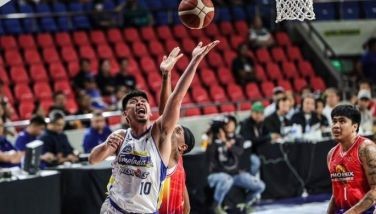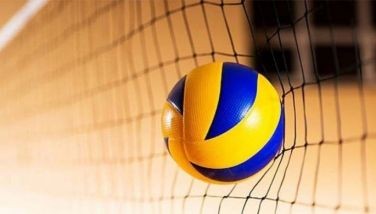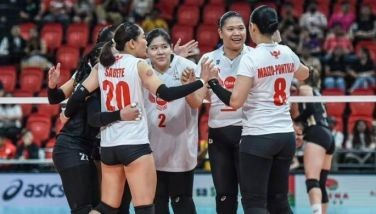The future is full time
Now that new leaders are in place at Gilas Pilipinas, it appears that the national basketball program may be leaning towards a full-time Philippine team. This development may seem like a “one step backward, two steps forward decision,” but it will be for the best. The Philippines has reached a level where it can no longer get away with natural ability, previous knowledge and a patchwork team, no matter how talented the players. As the saying goes, the modern definition of insanity is doing the same thing and expecting a different result.
In the 1970’s, Pres. Ferdinand Marcos tasked then-Education Secretary Carlos P. Romulo with studying why the Philippines was faltering in international athletic competition. At that time, the country had enjoyed almost half a century of dominance in Asian sports, even beyond. You wouldn’t hear of China, Australia or Lebanon coming close to beating Filipino athletes. Even at the Far Eastern Games (the precursor of the Asian Games), the Philippines was Goliath. In basketball, Japan would put up the occasional challenge. In Olympic hoops, the country even defeated African representatives.
Romulo’s research shed light on two changes in the sports landscape. First, other countries inevitably organized, developed, and narrowed the gap. Governments got involved, discovering what Filipinos already knew: sport is a great source of national pride and commercial boon. The second development was more ominous: Philippine sports officials and athletes had gotten complacent. Once you perceive yourself as the best, how do you get better? Why would you need to? The Philippines was the big fish in the Asian pond. But the other fish had gotten better. They had found a way to – pardon the pun – beat us at our own games. In a way, Rudy Salud knew this when he was PBA commissioner the following decade. At the time, he was reluctant to join the open basketball bandwagon. Instinctively, he must have sensed something.
The US encountered a similar situation in basketball and a few other sports. After decades of dominance, the Americans were soundly beaten in the 1988 Olympic basketball tournament. Constrained by having to field only amateurs, they sent a bunch of college players as usual. But in Europe, players could flip-flop between statuses, be pro one day and declare themselves amateur the next. They also had more relaxed rules on the age at which an athlete could turn pro. Teenagers did not need to go to college if they were skilled enough to play for money.
In the Philippines, many coaches are not patient enough to develop their players. They want finished products on their roster. In the US, you can get away with this to a certain degree in the NBA. There is so much talent there, it’s spread out, and it draws the best talent even from other countries. How many NBA players now came from outside the mainland, and went through the American educational system aiming for a shot at the NBA? High school players already play commercially. This writer often uses the example of Lamar Odom, who bounced around five high schools because he was more valuable as an athlete than as a student. Also, there is a great culture of passing on knowledge and learning. One of the things that helped Pat Riley coach the Los Angeles Lakers to all those championships in the 1980’s was that he was the only pro coach who attended college coaches’ camps back then.
This is where Tab Baldwin makes a difference. He has been adamant about turning to European influence to improve Philippine basketball. He does not have the American leaning that almost all coaches do. His World Hoops Clinic has remarkably brought in some of the greatest basketball minds from that continent. He knows that Serbia, France, Greece, Spain, Yugoslavia and their neighbors hold the key to global success. And other Filipino coaches are listening. If the US is our benchmark, we cannot beat them with their own style. That would be hubris, that a copycat could beat the original by doing the same thing. In Europe, skill, teamwork and – I hate to say it – common sense, dictate programs. This is where the Americans have fallen behind, importing more European players instead of studying what makes them excel.
This is also where the US made the same mistake, thinking that substituting NBA players in international competition would solve the problem. It just gave them a temporary head start. First, the rest of the world caught up. Secondly, the NBA experienced donor fatigue. Players who go through a grueling season and endless appearances are obligated to suit up for the national team. And the best players who play the most are the most conscripted. It became self-limiting. Gilas Pilipinas itself has already experienced players declining. Besides, the PBA has already helped the national team mightily for three decades.
The solution is simple: form a full-time national team whose players will not be poached by PBA squads. The formula has worked before. The continuity was interrupted by the EDSA uprising, and the change in national leadership also made it impossible to continue.
The only downside is the question of what the national team’s patron will get out of it. The Northern Cement experiment was abrogated in 1986. In 1990, PBA salaries took a huge jump. If one were to compensate national players in the same ballpark, the sponsor would not get the same advertising mileage a PBA team would. It would be difficult to write off such huge amounts. For the players, there would be no won-game bonuses or other incentives. Also, the PBA plays 10 months of the year. Would the national team return to the league as a guest?
On the upside, there would be more foreign training, faster growth, less wear and tear, more time for recovery. familiarity with the international game, and the honor of wearing the flag. The challenge would be finding players of comparable size and skill who would stay with the program for so many years. One thing is for sure, after their tour of duty, the national players will have a lasting impact on the PBA for the better. History has shown us this.
- Latest
- Trending





























